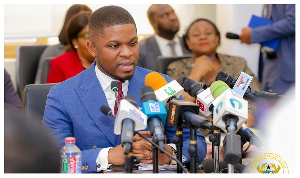; Is There Any Hope
Like many other developing countries, Ghana’s economic worth is to a greater extent dependent on her natural resource endowments. Invariably, minerals have the potential to contribute significantly to a country’s GDP, export revenues and tax receipts, contribute to poverty alleviation and broaden economic development at both local and national levels. Examples abound the world over of countries example Johannesburg in South Africa which developed from the mining of minerals and the rise of San Francisco in Northern California as a major industrial center after the discovery of Gold. These are practical examples of cities that have used their natural resources to develop other sectors of their economies.
This presupposes that, mining looked at from the economic point of view is an activity considered to be very desirable. However, viewed as an extractive activity, it is seen to have impacts likely to work against the proper and systematic development of mining communities. Despite the economic benefits that mining accrue to nations, experiences of mining communities throughout the world are so depressing that redefined commitment to internalizing the unconstructive externalities of particularly small scale mining firms ought to be approached with utmost urgency.
In Amansie West District, it is tear-jerking how cultivable lands have been rendered unproductive, large cocoa farms deforested and water bodies polluted by predominantly Chinese immigrants without any respect whatsoever to the future of the communities in which they operate. For some few dollars, the future of the population yet unborn is cheaply sold by chiefs, opinion leaders and influential people in these communities. What is more, contrary to using the proceeds from the sales of these lands to advance development in the area of education, health and physical accessibility, it is used in furthering self-seeking interests. The poor, voiceless, vulnerable and the less educated are always at the receiving end of the unfortunate decisions by the drivers of these communities.
On visiting Groso, Aboaboso, Takorasi and Manso Abore, many were the hearts and eyes that respectively sunk and wept at the sight of how productive lands had been mercilessly excavated and pit left naked and muddy. Only God can save the unfortunate souls that do not thread cautiously whilst walking along these death traps. For the generations yet unborn, the issue of how beneficial the natural reserve can be after the seemingly gross sense of disrespect for sustainable development by the local drivers has always been a source of great worry to many social and environmental activists.
No doubt, Ghana is the only country we can pride of and there are obviously no better people to constructively contribute to her development more than Ghanaians themselves. To propose the sacking of these foreign nationals and illegal mining firms is to sound very inhospitable and gratuitous. Nonetheless, the collective efforts of all and sundry including the Ministry of Trade and Industry, Ministry of Lands and Forestry, Ministry of Local Government and Rural Development, Traditional Authorities, Environmental Protection Agency, Ghana Chamber of Mines among others are needed on board to guarantee the much desired social, economic and environmental security of the local folks.
There should be renewed commitment at not merely insisting on the small scale mining firms internalizing their externalities but also, making sure their operations are subjected to periodic and comprehensive monitoring and evaluation. Not until this is done, the vulnerable in these setting will continue to suffer at the mercy of these mining firms.
More so, a comprehensive public education and capacity building workshops on sustainable development for both the traditional authorities and the small scale investors in the mining industry is greatly advised. Chiefs, opinion leaders, family heads, land owners and other well-meaning stakeholders must be made to appreciate the environmental, social and economic implications of their current decisions and indecisions.
Much as we all agree Ghana is heavily blessed with natural resources, it will also not be out of place to stress that these gifts of nature could be a source of doom if not cautiously exploited or left in the hands of greenhorn investors. It suffices to emphasize that, Ghana is essentially the only country we have and there is surely no one to develop it better than Ghanaians themselves. To say the progress of a nation lies exclusively in the hands of the government is to commit an embarrassing mistake. Conversely, a strenuous effort of both public and private institutions, Politicians, Chiefs, Professionals, Students, the young and the elderly, men and women is very much advised. It is with this that we can look forward to putting a lasting grin on the faces of the disadvantaged, marginalized and vulnerable dwellers in the mining communities. May the Lord grant the drivers of the nation the goodwill, fortitude and high sense of judgment to guide the nation to the desired destination.
Ishak Mohammed,
BSc. Development Planning,
Kwame Nkrumah University of Science and Technology
Ishakmohammed61@yahoo.com
Opinions of Friday, 27 July 2012
Columnist: Mohammed, Ishak














